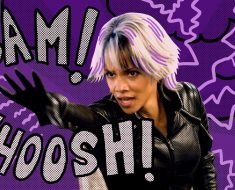We always remember the first time that we feel seen, the first time that we are exposed to the magic of seeing ourselves reflected in someone or something else. For marginalized people especially, the validation we get in seeing our reflections in others is more than important — it’s vital to our livelihood, to our existence. At the same time, we always remember the moments of being invalidated.
From a young age, I remember being distinctly aware of my blackness. I lacked the words to understand how race and racial identity were constructed then, but I knew that I was different. It would be many, many years until I was comfortable even relating my femmeness or my queerness to the idea of how I existed as a black woman, even quietly to myself. I used to think of these things as disparate, but I’ve come to better understand that otherness helps construct who we are and who we appear to be in the world. Janelle Monáe, from the time that I was introduced to her music, became influential in that process.
My introduction to Monáe came later than many other fans when I stumbled upon the remix of her single “Tightrope” on some iTunes playlist I downloaded from a friend. Coincidentally, "Tightrope" is the same song that made Ashley C. Ford, who wrote Allure's rich cover interview with Monae, fall in love with her music. While listening to the song, I was fascinated — Monáe, in her pompadour and black-and-white uniform, resonated with me because she embodied the quirky, black girl role models I was starved for when I was growing up.
Listening to that first album reminded me of my early adolescence, wearing out my beloved Fefe Dobson CD from too many listens in my Walkman because she was the only version of what a carefree black girl would look like in the music that pushed expectations of what someone like me could create. Though she leans closer to eclectic R&B and funk with catchy pop undertones, Monáe's music still managed to bring me back to finding myself in lyrics of Good Charlotte, Linkin Park, Daft Punk, and old mixes of other pop-punk bands at the beginning of the millennium. However, back then I hadn't felt brave enough to wish to see another black girl on the cover of those albums that shaped so much of my teenage years.
By the time I watched her video for “Q.U.E.E.N.” with Erykah Badu, I was hooked. Monáe’s stage presence was as big as the confidence I wanted to have in myself. Listening to her and watching her videos made me believe that I could be that way, too. It didn’t feel like a wistful fantasy — it was more confirmation that I had that confidence all along and I could make the decision to embrace it when I was ready.
A massive part of Monáe’s appeal from a fan standpoint is that she speaks to us in a way that erases those barriers of otherness. In fact, her music creates the invaluable message of belonging and importance that many of us may not have directly experienced otherwise. In fact, our most formative memories are often the opposite of belonging.
I remember vivid details about one day the summer that I was eight when a white person first called me the N-word: the color of my shirt, the temperature outside. And I remember that cruelty so sharply in my mind. Because of that experience and all the moments like it, the image presenting my authentic self to the world (which too often calls for conformity or making myself small) took decades to formalize fully in my mind, much less to say aloud. That’s why the power of representation and connecting to public figures matter more than many people — particularly those who rarely find themselves underrepresented — really understand.
Even though she was so relatable to me and others in her fan base, until recently, Monáe presented herself at a distance in interviews and interactions with the public. Her responses seemed to me to be a way to preserve her private identity, as though she wasn’t ready to be public with it at the time. Reading these interviews before I had come out fully to myself resonated deeply as a necessary reminder that privacy was a teacher; privacy could provide the quiet needed to really examine who we are without the outside pressure and noise.
When Monáe had officially come out as pansexual, I was moved to tears
— something that doesn’t happen often.
And, of course, there was the confessional moment in which Monáe opened up to the world after dropping her latest album, Dirty Computer. There were hints of her queerness before, but without direct confirmation, I had shelved it with cautious optimism. I didn’t want to assign hope that Monáe herself might be queer and later clarify that she wasn’t. I didn’t want the heartbreak of seeing myself reflected in a public figure only to realize that they were queer-baiting (or, alluding to queerness for the sake of profiting in some way) — an occasional and unfortunate occurrence in the pop-culture world.
Before confirmation of how she identified, I selfishly wanted Monáe to be queer because I wanted the permission I felt she gave me to be queer and multifaceted. And, despite my own quiet fandom, I saw myself in Monáe because even though she kept her sexuality private prior to Dirty Computer’s release, her art has always translated to the idea that there was so much more behind the curtain than what we as fans were allowed to see. I was comforted by the idea that power didn’t have to come from sharing yourself with the world before you were ready.
When I heard the news that Monáe had officially come out as pansexual, I was moved to tears — something that doesn’t happen often. I wrote about the joy of seeing other black femmes defining themselves on their own terms for my job, but even that piece didn’t completely convey what it meant to witness Monáe’s journey to come into herself.
Monáe gave us permission to embrace our authentic selves. To be
something 'other' — something more than we appear to be. It isn’t just
a choice, but an act of saving ourselves.
While reading the Rolling Stone interview in which she officially came out, I was reminded of my own journey of discovering myself. And it was an important reminder: Monáe’s journey up to this point shows me that there is no time limit to come into ourselves. We have so much time to evolve into the people that we were meant to be. Black women and femmes are rarely afforded the luxury of having that message directed toward us, of being centered in that story. Monáe is joining a legacy of black queer artists who have come before her: including Little Richard and her mentor Prince, as well as those who are evolving alongside her, like Frank Ocean and Le1f.
Her coming out wasn’t just a personal declaration, but a welcoming move to her fans. That matters.
In opening up and allowing us to see her authentic self, Monáe is giving us permission to embrace our own authentic selves as well. To be something "other," to be different — something more than we appear to be. It isn’t just a choice, but an act of saving ourselves. And now more than ever, we need that kind of contagious bravery.
You can follow Cameron on Twitter and Instagram.
Source: Read Full Article





